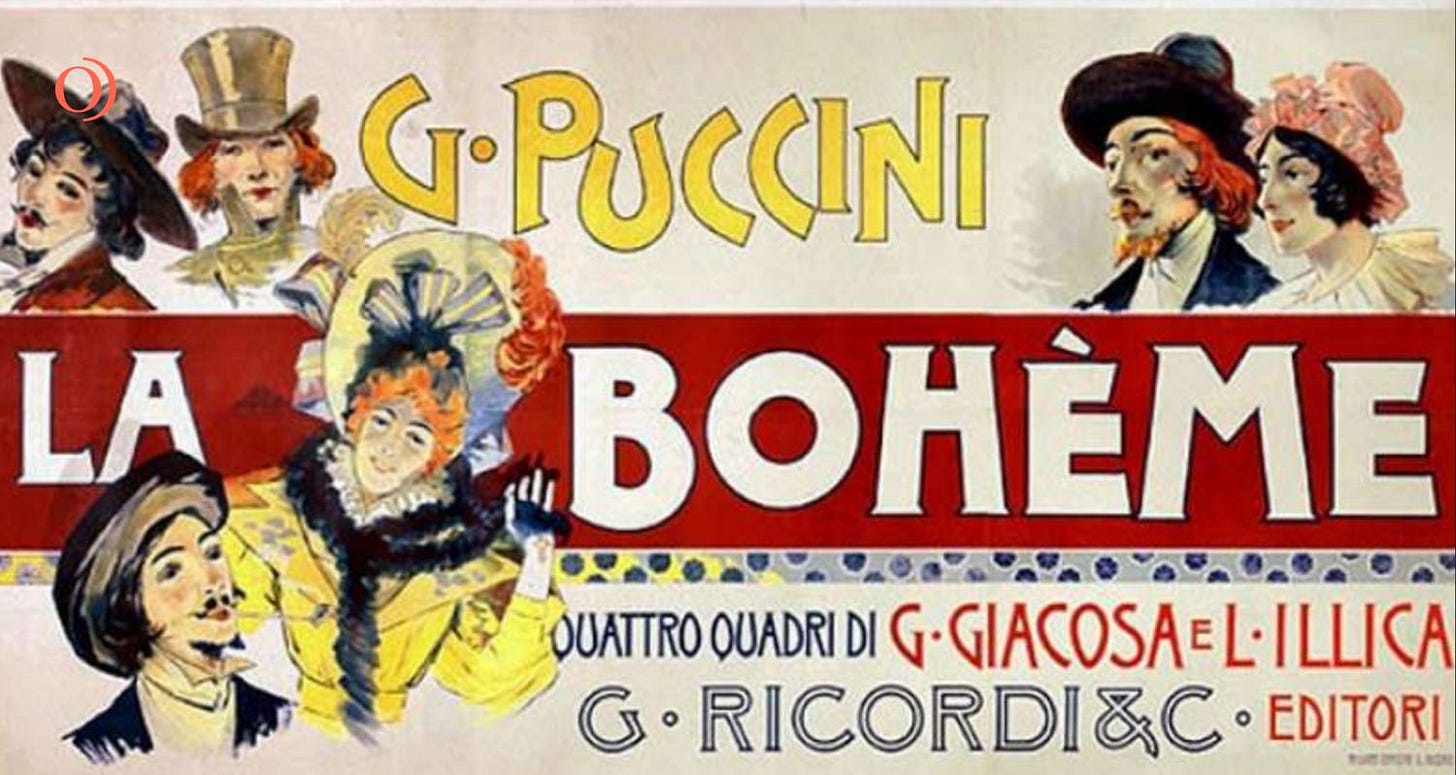Opera Daily 🎶 — Puccini's La Bohème
This week's Opera Daily features selections from Act 1 of the Italian opera La Bohème by Giacomo Puccini
👋 Hello to the new Opera Daily subscribers who have joined us this week. And Merry Christmas! I hope you’re sitting on a comfortable couch with a warm beverage and enjoying your weekend. You can check out the complete Opera Daily archives and the playlist on YouTube for more selections. If you were forwarded this email by a friend, join us by subscribing here:
Today, we’re listening to…
A popular Opera Daily throwback and a reader favorite today — selections from Act 1 of the Italian opera La Bohème by Giacomo Puccini.
It may have a sad ending, but La Bohème’s first two acts, set on Christmas Eve, felt like the perfect choice for this week.
La Bohème was first performed in 1896 in Turin, Italy.
Rodolfo is a poet, sharing a small room in Paris with his friends Marcello, a painter; Schaunard, a musician; and Colline, a philosopher. They live in a cardboard box with little to their names, but they pursue their art and are happy!
On Christmas Eve, a girl named Mimì knocks on their door looking for a light for her candle (hers has blown out), as the group keeps warm by feeding their stove with pages from Rodolfo’s (row-DOLL-foe) latest poem.
Mimì and Rodolfo fall in love (not so fast this is opera, remember?), but soon it becomes clear that Mimì is sick. La Bohème is one of those great love stories that make us believe, no matter how predictable the outcome.
In Act 1, Rodolfo introduces himself to Mimì in the aria “Che gelida manina”(“What a frozen little hand”). She responds with an aria of her own, “Mi chiamano Mimì (“Yes, they call me Mimi”), and then they sing of their newly found love in the duet “O soave fanciulla” (“Oh lovely girl”).
We are listening to Luciano Pavarotti sing the role of Rodolfo (tenor) and Mirella Freni sing the role of Mimì (soprano). If the first piece sounds familiar, “Che gelida manina” was the first aria we ever shared on Opera Daily.
🎧 Listening Example: (4 minute listen): “Che gelida manina”
🎧 Listening Example: (6 minute listen): “Mi chiamano Mimì”
🎧 Listening Example: (3 minute listen): “O soave fanciulla”
Puccini was inspired by his poor student days as he wrote this opera.
He said, “I lived that Bohème...”
The plot is simple: The two couples fall in love, out of love, and back in love again until, in the end, someone dies. Yes, it sounds simple(!), but Puccini, given his genius, can depict the characters’ personalities and relationship dynamics in detail. While the opera has four acts, Puccini didn't call them “acts”. He thought of them as “images”.
Want more?
Giacomo Puccini (1858 - 1924) was one of the most famous Italian opera composers (after Verdi, of course!). He wrote 16 operas, most of which are still performed today, including Tosca, La Bohème, Madama Butterfly, and Turandot.
We hinted at the verismo period (Italian for “realism”, from vero, meaning "true") when we covered La Rondine, another Puccini opera. The term describes a style that became popular in the last decade of the 19th century. Puccini was probably the most prominent of the verismo composers. In contrast to the characters of earlier operas, in verismo, Puccini portrays everyday people in his works—like the artists of La Bohème. Puccini once said his success was his ability to put “great sorrows in little souls”.
La Bohème has influenced everything from the Broadway musical Rent to The Simpsons. Jonathan Larson’s 1994 musical Rent is based directly on the opera, changing the setting from Paris to New York City, where a group of young artists struggle in the Lower East Side. Another aria from opera, Musetta’s Waltz was adapted for Bobby Worth’s 1959 R&B hit Don’t You Know, sung by Della Reese. The 1987 romantic comedy Moonstruck is filled with La Bohème references.
“Quando m’en vo” (also known as “Musetta's Waltz”) is another famous aria sung by Musetta (soprano) in the time signature of a waltz. It’s very well known, especially amongst young sopranos. Musetta attempts to make her boyfriend Marcello jealous and sings about how everyone notices her beauty when she goes out. This is a famous aria, so many interpretations are floating around. If you are curious, here are several: Anna Netrebko, Kiri Te Kanawa, and Anna Moffo.
Merry Christmas!
Grateful for your time and ears,
Michele
PS. Missed our last edition? We featured “Amor ti vieta” from the Italian opera Fedora.
❤️ Enjoyed this piece? Hit the heart to like it. It helps others find Opera Daily.




Still remember Carol Neblett as Musetta stopping NYC Opera BOHEME with her thrilling wild Musetta,.
Also LaScala telecast with Freni/Pavarotti and Catlos Kleiber, where I appeared in Act 2 as a Parisiam pedestrian in Milan. Great memories.
One of my most favorite operas. Still, 40 years on, Rodolfo's anguished "Mimi! Mimi!" in Act IV when he realizes she's died gives my goosebumps. Many great performances, but Pavarotti and Freni are very special! Thanks. Happy Holidays!!